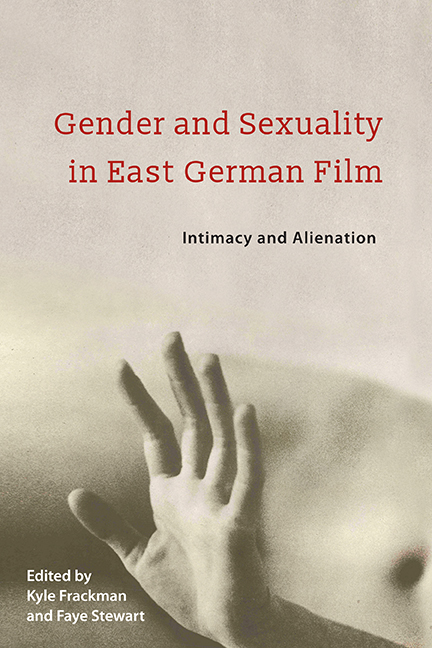Book contents
- Frontmatter
- Contents
- Acknowledgments
- List of Abbreviations
- Introduction: Sex and Socialism in East German Cinema
- 1 Hypnagogic Mothers: Gender, Amateur Film Labor, and the Transmissive Materiality of the Maternal Body
- 2 Powerless Heroines: Gender and Agency in DEFA Films of the 1960s and 1970s
- 3 Jutta Hoffmann and the Dialectics of Happiness: A Socialist Star in Close-Up
- 4 Who Is the “Third”? Homosociality and Queer Desire in Der Dritte
- 5 Volatile Intimacies and Queer Polyamory in GDR Film
- 6 Interracial Romance, Taboo, and Desire in the Eastern Counter-Western Blutsbrüder
- 7 The Desire to Be Desired? Solo Sunny as Socialist Woman's Film
- 8 Ambivalent Sexism: Gender, Space, Nation, and Renunciation in Unser kurzes Leben
- 9 Dealing with Cancer, Dealing with Love: Gender, Relationships, and the GDR Medical System in Lothar Warneke's Die Beunruhigung
- 10 Reimagining Woman: The Early Shorts of Helke Misselwitz
- 11 Shame and Love: East German Homosexuality Goes to the Movies
- 12 Gendered Spectacle: The Liberated Gaze in the DEFA Film Der Strass
- Notes on the Contributors
- Index
8 - Ambivalent Sexism: Gender, Space, Nation, and Renunciation in Unser kurzes Leben
Published online by Cambridge University Press: 16 May 2018
- Frontmatter
- Contents
- Acknowledgments
- List of Abbreviations
- Introduction: Sex and Socialism in East German Cinema
- 1 Hypnagogic Mothers: Gender, Amateur Film Labor, and the Transmissive Materiality of the Maternal Body
- 2 Powerless Heroines: Gender and Agency in DEFA Films of the 1960s and 1970s
- 3 Jutta Hoffmann and the Dialectics of Happiness: A Socialist Star in Close-Up
- 4 Who Is the “Third”? Homosociality and Queer Desire in Der Dritte
- 5 Volatile Intimacies and Queer Polyamory in GDR Film
- 6 Interracial Romance, Taboo, and Desire in the Eastern Counter-Western Blutsbrüder
- 7 The Desire to Be Desired? Solo Sunny as Socialist Woman's Film
- 8 Ambivalent Sexism: Gender, Space, Nation, and Renunciation in Unser kurzes Leben
- 9 Dealing with Cancer, Dealing with Love: Gender, Relationships, and the GDR Medical System in Lothar Warneke's Die Beunruhigung
- 10 Reimagining Woman: The Early Shorts of Helke Misselwitz
- 11 Shame and Love: East German Homosexuality Goes to the Movies
- 12 Gendered Spectacle: The Liberated Gaze in the DEFA Film Der Strass
- Notes on the Contributors
- Index
Summary
LOTHAR WARNEKE'S Unser kurzes Leben (Our Short Life, 1981) presents viewers with a character negotiating her identity in professional life and public and private spaces. Adapting Judith Butler's position on gender performance to a broader context, we can say that for the protagonist, Franziska Linkerhand, the negotiation is “a practice of improvisation within a scene of constraint.” The “scene of constraint” in this instance is primarily the discipline in which Franziska works. An architect, she labors in a state-run institution that can be read as a cipher for the approximately thirty-year-old East German state she inhabits. The film frames this discipline as a microcosm of the totalitarian state, drawing on parallels to offer ways of seeing the state that may not be otherwise self-evident. Unser kurzes Leben points to architecture as an exploration of how the body moves in and experiences space. An endeavor in drafting and building, architecture is also a kind of diagnosis and treatment of the individual and of social bodies in space. A close reading of the film amplifies and helps further theorize the aspects of identity related to time, space, and repetitive acts that Judith Butler made so pivotal in Gender Trouble.
While Unser kurzes Leben depicts a woman trying to negotiate her way within a traditionally male-dominated field, the film does not draw overt attention to gender as a category of analysis. Given that architecture can be seen to represent a system of control and is tied to nation and the body politic, examining its depiction here reveals how the ostensibly objective spaces and places through which people move are marked by multiple ideologies that intersect with and complicate each other and are difficult to contest on a daily basis. The film demonstrates how understandings of gender and nationality coalesce and shape the physical world and the professions—architecture standing in as an example—and how, once shaped, the physical world and those professions in turn elicit sets of gendered and national performances. And so the film instantiates the East German male citizen as fundamentally different from the East German female citizen who becomes, in an ambivalently sexist way, the model citizen.
- Type
- Chapter
- Information
- Gender and Sexuality in East German FilmIntimacy and Alienation, pp. 166 - 184Publisher: Boydell & BrewerPrint publication year: 2018



